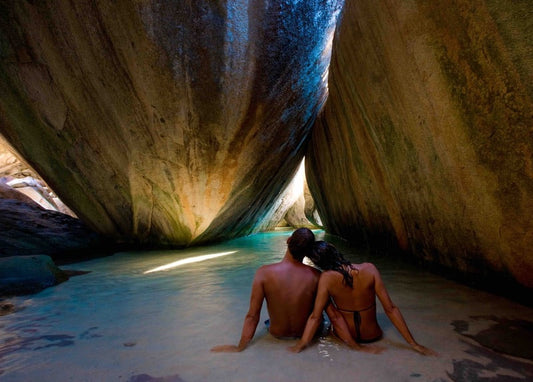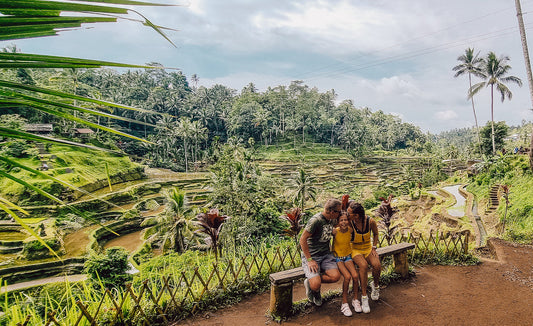All inclusive vacation, backpacking Europe, hobos… We all have a different way of traveling. And the way we travel can and probably will change over time. A lot of different words are used to describe traveling behaviors, and some are more glamorous than others. What kind of traveler are you?
I have met a lot of people in my 10 years of traveling around the world: a lot of travelers, a lot of tourists and a lot of locals. It has always intrigued me the distinction in the way people travel: there’s an unsaid taboo hierarchy between travelers. I thought it would be fun to define the different types of travelers, without any judgement, and classify them, only to understand people better.
I’ve come up with 2 types of classification: the simplified one and the most advanced one.

But first, what is a traveler? A traveler is much more than a person moving from one place to another. If that was the definition, then every time we would have a layover in a different country, we could consider we’d have visited that country, and it’s definitely not the case! So to go to a certain place is not enough to call ourselves travelers.
Some might say a traveler is someone who learn new things about a destination. Once again, if that was a traveler’s definition, someone who learns new facts on TV could be called a traveler. That’s obviously not the case! No, traveling is more than learning: it’s experiencing for real. Living new things.
A traveler is someone who goes to a different place than home, AND experience new things. This is my definition of a traveler. It doesn’t matter if we are traveling to another country or our own, it’s all about the moving and the experiencing.
So here’s my simplified classification!
The Simplified Classification
The Tourist
I think tourists are a very different kind of travelers. Tourists are people who go on vacation to relax and rest, usually in a similar or better state of luxury than at home. They usually go on all inclusive vacations, and rarely leave the resort. They eat the same food as home, have the same amenities, and expect people to talk to them in their own language.
I have a lot of trouble calling tourists travelers, because they are learning almost nothing from that foreign culture, if at all.

Let’s say I am a Canadian who goes to Greece. It looks like traveling, unless I stay on a resort for 2 weeks and barely explore the country. So it’s not how far we are going, or if we take the plane or our car to go there. It’s all about experiencing foreign cultures.
And it’s OK for someone to take a vacation to relax and unwind. This world is so stressed, we all need some time to relax now and then.
The Easy Traveler
The easy traveler is someone who travels with a tour guide, on a tour trip. It’s a bought package that leaves little imagination or spontaneity. It’s easy, because there’s no planning to do, no research, no deciding after the tour is booked. We follow someone who will decide what we will experience. We even know before we leave exactly what we will experience!

The Easy Traveler might be someone who is scared to travel, and having someone holding their hand all the way through a foreign journey is very reassuring. If it’s the only way they are able to travel without being frozen by fear, then it’s the best way to travel! Better travel than nothing!
The Dependant Traveler
The Dependant Traveler research the country they want to visit. They know what they want to see and not, they read and decide almost all of their itinerary. But they don’t plan: somebody else do it for them. They might not like to take care of all the booking details, or maybe they just want to receive savvy suggestions and advice from a professional. They leave all the planning to a tier, like a travel agent. Everything is booked in advanced, sometimes even paid in advance. No bad or good surprises. Plain security, but, unlike the easy travelers, they have a word in the process.
The Independent Traveler
If you plan and organise your own trips, take care of all the booking details, you are an independent traveler. There’s a difference between travelers who book their details and the ones who don’t, because we can learn a lot from the way people move around in their own country, where’s the best spot to stay, etc. And looking at all those details give a lot more knowledge to a traveler than someone who doesn’t.
The Backpacker and Flashpacker
No plans, no bookings, and a vague idea of an itinerary: this is what strive a backpacker or flashpacker. By the way, what’s a flashpacker? It’s a new word describing people that go to the same destinations as the backpackers, experience quite the same thing, but with a little more budget. We used to be backpackers (traveling on the cheapest buses and staying at hostels), but with our little girl, now, we appreciate an AC bus and a private room. We are now flashpackers!

When we have no plans and no bookings, we have to rely on our instinct, and trust people and locals we meet along the way. There’s an end to what we can decide based on the Intel that’s available on the web. The vibe and the feeling of a place isn’t available on Google. That’s why backpackers and flashpackers learn even more from a foreign culture.
The Hobo
No plans, no itinerary, no return. It’s a way of living. Couchsurfing, extreme budget traveling, this is a way to live freely. A lot of hobos live with the local people, so they experience to another level the foreign culture.

Like I said before, we can experience different kinds of traveling during a lifetime. When we traveled to Greece, we were backpacking for part of our trip, booked some hotels for another part and even took a guided tour to see the main on-land sights. That’s why we cannot classify people as tourists or flashpackers, but we can classify their behavior at a certain time. And it’s OK to change, because change is a constant. Everything changes all the time, and we are too. There’s nothing more weird than an old person who refuses to change and ‘tries’ to fit with the young ones!
I have to say that my simplified classification is very imperfect. I think it’s the easiest and fastest way to separate tourists from hobos and other type of travelers, and to assume the level of experiencing they have. But I don’t want to make a fast judgement solely on people’s budget or disliking to plan every little detail of their trip. So here’s my advanced classification.
The Advanced Traveler Classification
If we push the reasoning a little further, I think we can divide travelers in the amount of new experiences they live while traveling. Because you know what? There are some tourists who really get into the foreign culture and try everything that comes up, and there are hobos who, for saving money, will eat self cooked spaghetti every night at their hostel, and miss on the local foods, and not attend cultural attractions because they are too expensive.

That’s why I think the advanced classification that we can make of the different types of travelers depends on the amount of new learning experiences they have.
Here’s a list of all the aspects of a culture we can experience while traveling (it might not be exhaustive, send me an email if I forgot something!):
People / Adventure / Landscape / Language / Animals / Flora
So, according to this list, there are 12 aspects of a country’s culture. We could say each aspect is worth 1 point. Then, we can add 1 point with each aspect that we are experiencing while traveling. The closer we are to a perfect score (12/12), the ‘better’ of a traveler we are.
There are no words describing each traveler’s category with this advanced method, since the possibilities are endless. That’s why I use the words ‘best’ and ‘worst’ travelers. Since travel is all about experiencing, the more we learn and discover in all of those aspects, the better traveler we are.
There’s a learning curve to traveling. Most people will start the easy way, on a small trip, not too far from home. We get to know our comfort zone, go beyond it to experience more, or not. We all have a choice. No culture is better than the others. We can all learn from one another. And experiencing something is the best way to learn.
Who is the ultimate traveler? The ultimate traveler is not only a citizen of its own country, visiting others. The ultimate traveler is a world citizen, seeing the map without borders and without pre-judgement. The ultimate traveler doesn’t have to like every part of the world and everyone, but he wants to experience by himself those other cultures. It’s a mindset, an attitude.
Are you the ultimate traveler?







